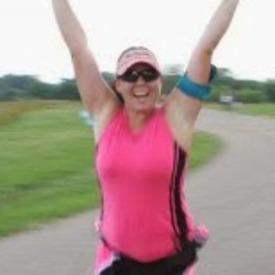Tips on how this works

gunnadoit28
Posts: 4 Member
Its my first day doing this calorie counting.
Please gives me tips on how to stay at my calorie goal
And how this works
Thanx
Please gives me tips on how to stay at my calorie goal
And how this works
Thanx
0
Replies
-
1. Set your goals realistically.
2. Buy a food scale...digital is preferred.
3. Weigh your food.
4. Log your food.
5. Stay in your calorie deficit.
6. Rinse and repeat.
Edited to highlight realistically.0 -
-
Thank you0
-
A calorie is a unit of energy...your body needs a certain amount of that energy to maintain weight. The average woman needs 2,000 calories and the average male needs around 2,500; however, the more overweight your are the more calories (energy) required to maintain weight...also the more active you are, the more energy is required for you to maintain weight.
What calculators like MFP do is use your personal statistics to determine what your calorie requirements would be to lose weight, maintain, or gain...whatever your goal is. It uses statistical averages to accomplish this. MFP works a little differently than most traditional calorie calculators in that the activity level you select is just your day to day type of stuff...it does NOT include an estimate of your exercise activity. With MFP you get credit for exercise after it has been performed and logged and you get add'l calories as an estimate of that activity is NOT accounted for previously in your activity level. You just have to be conservative in you estimate of calorie burn (you don't burn as much as you think you do). Other calculators will have you presume X hours of exercise per week and include some estimate of the energy required to accomplish those activities and thus you would not eat back calories if you used another calculator to determine your calorie goals.
MFP does all of the math for you...your calorie goal is a rather substantial deficit from your theoretical maintenance...you simply net to your calorie goal. Calorie counting does require precision to work effectively though...this means using a food scale and weighing most things that have weight as an option for serving size and measuring pretty much everything else. You also have to be consistent and realize that all of this takes time...patience is required.
You will not lose weight in a linear fashion...you will have weeks with bigger losses and smaller losses and no losses and even gains (water retention)...your weight loss will be a general trend over a much longer period of time than just day to day and week to week...don't get too wrapped up in the minutia and keep your eye on the bigger picture.
Common pitfalls:
- having too large of a calorie deficit resulting in a lack of dietary adherence (binges, closet eating, giving up in general, etc)
- underestimating intake...eyeballing portions will likely result in substantial underestimation of calorie intake.
- eating in an unrealistic way...you want to focus your diet on getting lots of nutrition, but if you just go and give everything in the world up that you love, you will most likely fail as that really isn't realistic or sustainable long term. Learning moderation and proper portion control really is the key to sustainability.
- overestimating calorie burn. While your sweat and fatigue may indicate to you that you just burned a crap ton of calories...reality says otherwise. exercise in general accounts for only a very small portion of our daily calorie requirements. The vast majority of your body's energy requirements are just to keep your organs working and keeping you alive...
- exercise over-kill. people tend to think they need to workout for hours and hours every single day...this is not the case...you do not need to burn off every last calorie with exercise...your diet already has your weight loss deficit built in. exercise in a safe and sustainable fashion...use your diet for weight control and exercise for fitness. Set fitness goals that are independent of your calorie burn and weight loss goals...again, your deficit is built into your calorie goal...you don't need to make it bigger with exercise.0 -
My #1 tip is to eat REAL food! Skip the processed snacks (even if they are "only 100 calories") and grab some fruits & veggies for snacks, make your own lunch and dinner, and try to make sure you're eating enough protein and fiber to keep you full.
Plus, don't give up when the scale stops budging or if you totally indulged one day and binge ate 2000 calories over your allowance. Don't wallow in the self pity, just put it behind you and start fresh the next day.0 -
Measure your food and log it before you put the food into your mouth.
Stop eating when you reach your limit.0
This discussion has been closed.
Categories
- All Categories
- 1.4M Health, Wellness and Goals
- 398.5K Introduce Yourself
- 44.7K Getting Started
- 261K Health and Weight Loss
- 176.4K Food and Nutrition
- 47.7K Recipes
- 233K Fitness and Exercise
- 462 Sleep, Mindfulness and Overall Wellness
- 6.5K Goal: Maintaining Weight
- 8.7K Goal: Gaining Weight and Body Building
- 153.5K Motivation and Support
- 8.4K Challenges
- 1.4K Debate Club
- 96.5K Chit-Chat
- 2.6K Fun and Games
- 4.8K MyFitnessPal Information
- 18 News and Announcements
- 21 MyFitnessPal Academy
- 1.5K Feature Suggestions and Ideas
- 3.2K MyFitnessPal Tech Support Questions





